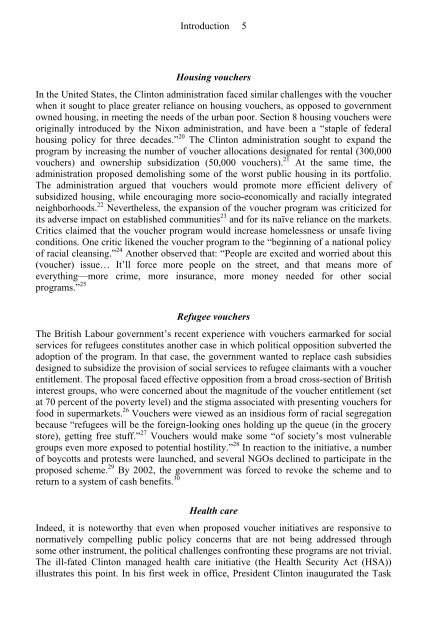Rethinking the Welfare State: The prospects for ... - e-Library
Rethinking the Welfare State: The prospects for ... - e-Library
Rethinking the Welfare State: The prospects for ... - e-Library
You also want an ePaper? Increase the reach of your titles
YUMPU automatically turns print PDFs into web optimized ePapers that Google loves.
Introduction 5<br />
Housing vouchers<br />
In <strong>the</strong> United <strong>State</strong>s, <strong>the</strong> Clinton administration faced similar challenges with <strong>the</strong> voucher<br />
when it sought to place greater reliance on housing vouchers, as opposed to government<br />
owned housing, in meeting <strong>the</strong> needs of <strong>the</strong> urban poor. Section 8 housing vouchers were<br />
originally introduced by <strong>the</strong> Nixon administration, and have been a “staple of federal<br />
housing policy <strong>for</strong> three decades.” 20 <strong>The</strong> Clinton administration sought to expand <strong>the</strong><br />
program by increasing <strong>the</strong> number of voucher allocations designated <strong>for</strong> rental (300,000<br />
vouchers) and ownership subsidization (50,000 vouchers). 21 At <strong>the</strong> same time, <strong>the</strong><br />
administration proposed demolishing some of <strong>the</strong> worst public housing in its portfolio.<br />
<strong>The</strong> administration argued that vouchers would promote more efficient delivery of<br />
subsidized housing, while encouraging more socio-economically and racially integrated<br />
neighborhoods. 22 Never<strong>the</strong>less, <strong>the</strong> expansion of <strong>the</strong> voucher program was criticized <strong>for</strong><br />
its adverse impact on established communities 23 and <strong>for</strong> its naïve reliance on <strong>the</strong> markets.<br />
Critics claimed that <strong>the</strong> voucher program would increase homelessness or unsafe living<br />
conditions. One critic likened <strong>the</strong> voucher program to <strong>the</strong> “beginning of a national policy<br />
of racial cleansing.” 24 Ano<strong>the</strong>r observed that: “People are excited and worried about this<br />
(voucher) issue… It’ll <strong>for</strong>ce more people on <strong>the</strong> street, and that means more of<br />
everything—more crime, more insurance, more money needed <strong>for</strong> o<strong>the</strong>r social<br />
programs.” 25<br />
Refugee vouchers<br />
<strong>The</strong> British Labour government’s recent experience with vouchers earmarked <strong>for</strong> social<br />
services <strong>for</strong> refugees constitutes ano<strong>the</strong>r case in which political opposition subverted <strong>the</strong><br />
adoption of <strong>the</strong> program. In that case, <strong>the</strong> government wanted to replace cash subsidies<br />
designed to subsidize <strong>the</strong> provision of social services to refugee claimants with a voucher<br />
entitlement. <strong>The</strong> proposal faced effective opposition from a broad cross-section of British<br />
interest groups, who were concerned about <strong>the</strong> magnitude of <strong>the</strong> voucher entitlement (set<br />
at 70 percent of <strong>the</strong> poverty level) and <strong>the</strong> stigma associated with presenting vouchers <strong>for</strong><br />
food in supermarkets. 26 Vouchers were viewed as an insidious <strong>for</strong>m of racial segregation<br />
because “refugees will be <strong>the</strong> <strong>for</strong>eign-looking ones holding up <strong>the</strong> queue (in <strong>the</strong> grocery<br />
store), getting free stuff.” 27 Vouchers would make some “of society’s most vulnerable<br />
groups even more exposed to potential hostility.” 28 In reaction to <strong>the</strong> initiative, a number<br />
of boycotts and protests were launched, and several NGOs declined to participate in <strong>the</strong><br />
proposed scheme. 29 By 2002, <strong>the</strong> government was <strong>for</strong>ced to revoke <strong>the</strong> scheme and to<br />
return to a system of cash benefits. 30<br />
Health care<br />
Indeed, it is noteworthy that even when proposed voucher initiatives are responsive to<br />
normatively compelling public policy concerns that are not being addressed through<br />
some o<strong>the</strong>r instrument, <strong>the</strong> political challenges confronting <strong>the</strong>se programs are not trivial.<br />
<strong>The</strong> ill-fated Clinton managed health care initiative (<strong>the</strong> Health Security Act (HSA))<br />
illustrates this point. In his first week in office, President Clinton inaugurated <strong>the</strong> Task


